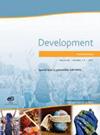对Azim Surani的采访。
IF 3.6
2区 生物学
Q1 DEVELOPMENTAL BIOLOGY
引用次数: 0
摘要
Azim Surani教授是英国剑桥戈登研究所表观基因组学和生殖系印迹学主任。他是今年著名的京都奖和保罗·埃利希和路德维希·达姆施泰特奖的获得者,以表彰他对发现基因组印记的贡献,这是现代表观遗传学领域的基础。为了纪念这项开创性工作40周年,在英国剑桥大学国王学院举行了一场名为“印记、生殖系以及我们是如何走到这一步的”的纪念会议。除了会议记录,我们还采访了苏拉尼教授关于他进入学术界的非传统和鼓舞人心的路线。本文章由计算机程序翻译,如有差异,请以英文原文为准。
An interview with Azim Surani.
Professor Azim Surani is the Director of Epigenomics and Germline Imprinting at the Gurdon Institute in Cambridge, UK. He is this year's recipient of both the prestigious Kyoto Prize and the Paul Ehrlich and Ludwig Darmstaedter prize, recognising his contributions to the discovery of genomic imprinting, the foundation of the modern field of epigenetics. In honour of the 40th anniversary of this seminal work, a Festschrift meeting was held at King's College, Cambridge, UK, titled 'Imprinting, Germlines, and how we got here'. In addition to the meeting notes, we interviewed Professor Surani about his non-traditional and inspirational route into academia.
求助全文
通过发布文献求助,成功后即可免费获取论文全文。
去求助
来源期刊

Development
生物-发育生物学
CiteScore
6.70
自引率
4.30%
发文量
433
审稿时长
3 months
期刊介绍:
Development’s scope covers all aspects of plant and animal development, including stem cell biology and regeneration. The single most important criterion for acceptance in Development is scientific excellence. Research papers (articles and reports) should therefore pose and test a significant hypothesis or address a significant question, and should provide novel perspectives that advance our understanding of development. We also encourage submission of papers that use computational methods or mathematical models to obtain significant new insights into developmental biology topics. Manuscripts that are descriptive in nature will be considered only when they lay important groundwork for a field and/or provide novel resources for understanding developmental processes of broad interest to the community.
Development includes a Techniques and Resources section for the publication of new methods, datasets, and other types of resources. Papers describing new techniques should include a proof-of-principle demonstration that the technique is valuable to the developmental biology community; they need not include in-depth follow-up analysis. The technique must be described in sufficient detail to be easily replicated by other investigators. Development will also consider protocol-type papers of exceptional interest to the community. We welcome submission of Resource papers, for example those reporting new databases, systems-level datasets, or genetic resources of major value to the developmental biology community. For all papers, the data or resource described must be made available to the community with minimal restrictions upon publication.
To aid navigability, Development has dedicated sections of the journal to stem cells & regeneration and to human development. The criteria for acceptance into these sections is identical to those outlined above. Authors and editors are encouraged to nominate appropriate manuscripts for inclusion in one of these sections.
 求助内容:
求助内容: 应助结果提醒方式:
应助结果提醒方式:


